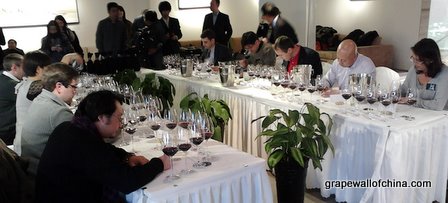~
We asked the judges in this week’s Ningxia vs Bordeaux Challenge to rank ten wines from first to last in terms of quality (see results here). But as in the Grape Wall Challenge, we also asked them how much they liked or disliked each wine.
The judges had four options: “love itâ€, “like itâ€, “don’t like it†or “hate itâ€. This methodology seems to bother some wine industry people but I don’t care. As a consumer, I wanted to know the wines judges think are best made and the wines judges most enjoy.
More than half of the judges “liked†or “loved†the following wines (out of nine votes as one judge did not fill in this part):
8 votes: Silver Heights The Summit 2009 / 3 loves, 5 likes
8 votes: Helan Qing Xue Jia Bei Lan 2009 / 2 loves, 6 likes
7 votes: Grace Vineyard Chairman’s Reserve 2009 / 3 loves, 4 likes
7 votes: Silver Heights Family Reserve 2009 / 7 likes
6 votes: Grace Vineyard Deep Blue 2009 / 3 loves, 3 likes
5 votes: Barons de Rothschild Saga Medoc 2009Â / 1 love, 4 likes
5 votes: Cordier Prestige Rouge 2008 / 5 likes
Kressmann Grande Réserve St-Émilion AOC 2008 and Mouton Cadet Reserve Medoc 2009 each received one “loveâ€.
For even more love, here are some of the more positive comments on each wine. I have put the wines in order of pouring.
Kressmann Grande Réserve St-Émilion AOC 2008
“A classic Cab. Fruityâ€, “Simple Bordeaux style with touch of oakâ€, “Fruit, fresh acidity, medium body, long finishâ€
Helan Qing Xue Jia Bei Lan Cabernet Dry Red 2009
“Nice nose, nice tannins, good ‘woody’ tasteâ€, “Rich fruits on the nose. Elegant. Licoriceâ€, “Spicy, full-bodied, finish is long and intensiveâ€, “Mushroom. Chocolateâ€
Silver Heights Family Reserve 2009
“Nice structure but high acidityâ€, “Deep ruby, full-bodied and powerful, medium lengthâ€, “Truffle. Violet. Strawberry cake. Plumâ€, “Cooked vegetable. Nice acidity. A little smokyâ€
Grace Vineyard Chairman’s Reserve 2009
“Nice ‘wood’, good balance, fresh tasteâ€, “Spicy, full-bodied and balancedâ€, “Delicate, classic. Gooseberry aroma. Smooth with long lengthâ€, “Nice noise, ripe fruit, with vegetal [character]. Very suppleâ€
Calvet Reserve De L’Estey Medoc 2009
“Well-done, balanced, with potential. Not too expressive at presentâ€, “Not big or complicated but balancedâ€, “Sweeter tannin. Good fruit, long aftertaste.â€
Mouton Cadet Reserve Medoc 2009
“Fruit, very well-balanced, nice finishâ€, “Incense and lavender. Nose is better than palateâ€, “Delicate smooth tanninsâ€
Cordier Prestige Rouge 2008
“Some expression of characterâ€, “The best aroma. Weak in the middle but good skill behind the wineâ€, “Tobacco, forest. A bit thinner and less structuredâ€
Silver Heights The Summit 2009
“Nice fruit, good tanninsâ€, “Beautiful mouth feelâ€, “Quite oaky, with vanilla, spice, chocolate. Could stay longer in the barrelâ€, “Cedar, smoky intense balsamic. Structured with a good finishâ€
Barons de Rothschild Saga Medoc 2009 (rmb350)
“The most classic: fruity and balancedâ€, “Elegant and fresh; long and balancedâ€, “Round fruit, high alcohol, oaky finishâ€
Grace Vineyard Deep Blue 2008
“Fruity and lovely to drink now with meatâ€, “Spicy with fresh acidityâ€, “Very aromatic. Cherry and flowers with a hint of oakâ€, “Complex and old-fashionedâ€
See also:
